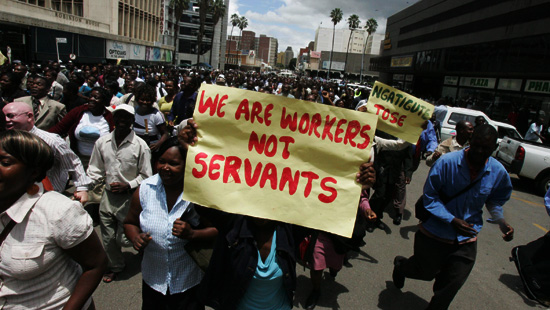
Government is set to cut allowances for its workforce in a cost-cutting move that is expected to see huge income losses for civil servants.
Our Staff
Earnings for most government workers are made up more of allowances than basic pay. The move is designed to create fiscal space for other capital expenditures.
Finance minister Patrick Chinamasa said last month that government would cut the wage bill by half, from 80 to 40% of national budget.
Among other measures, Chinamasa said government would stop carrying the burden of its employees’ pension contributions on its own. Government had taken the full responsibility of its workers’ pensions in February 2009 because of limited employee benefits.
“…the progressive review of remuneration levels across the Public Service, since 2009, warrants the re-introduction of employee pension contributions,” Chinamasa said.
He said the proposed re-introduction of employee pension contributions would constitute the initial tentative steps towards adopting a funded Public Service Pension Scheme which entailed that government and employees jointly contribute towards the funding of members’ future pensionable benefits.
The move comes as the central bank has also proposed fiscal and internal devaluation, terms literally meaning cutting down on employees’ financial benefits including allowances.
- Chamisa under fire over US$120K donation
- Mavhunga puts DeMbare into Chibuku quarterfinals
- Pension funds bet on Cabora Bassa oilfields
- Councils defy govt fire tender directive
Keep Reading
Fiscal devaluation is a combination of two measures: decrease in social contributions paid by employers and an increase in consumption tax.
The reduction in employers’ social contributions reduces the unit labour costs. If the latter are passed through into final prices, the improvement in price competitiveness would favour exports and reduce imports. Internal devaluation looks at reducing the cost of doing business in an economy.
There are now fears that government will cut allowances received by the civil servants.
Civil servants get transport and housing allowances, among other benefits which augment their low salaries.
Analysts yesterday said they feared the private sector could also follow suit and cut down on allowances, especially those that were not negotiated by the employee and the employer. the High Court recently ruled that employees had no legal rights to such allowances.
Jacob rice, secretary for economic affairs in the Zimbabwe Federation of trade Unions told The Standard that it would be bad if companies were to scratch allowances as they augmented low salaries.
He said the Zimbabwean economy was in bad shape and businesses that were still operating were ever in debt. He applauded the Labour Amendment Bill, likening it to “a rubbish bin which contained rubbish, but in which someone had thrown some jewellery”.
“We are bending towards the demands of the Bretton Woods,” he said. Progressive teachers Union of Zimbabwe secretary general Raymond Majongwe told The Standard that the move to cut allowances for civil servants would be a tragedy for the workers.
“Any tinkering or tampering with allowances will be wrong as government has failed to provide non-monetary incentives,”Majongwe said.
“If they [government] are honest, they are supposed to engage.”
Majongwe said government had started freezing or suspending salaries for minor offences under the guise that the affected teachers were not at their work stations when the head count was conducted.
Employers’ Confederation of Zimbabwe president Jack Murehwa said the biggest threat facing companies was low productivity coupled with a huge workforce.
“We are operating at low capacity with the same number of people that can work at high production. the moment we start operating at 100%, costs per unit will come down,” he said.











